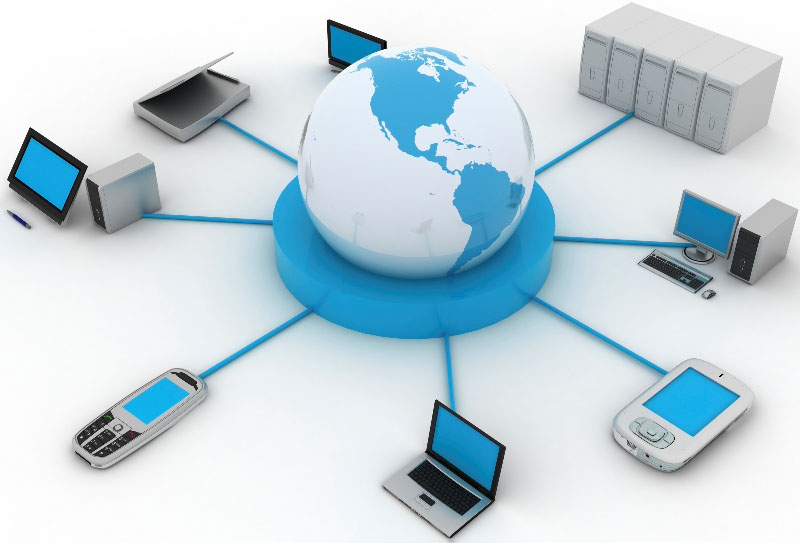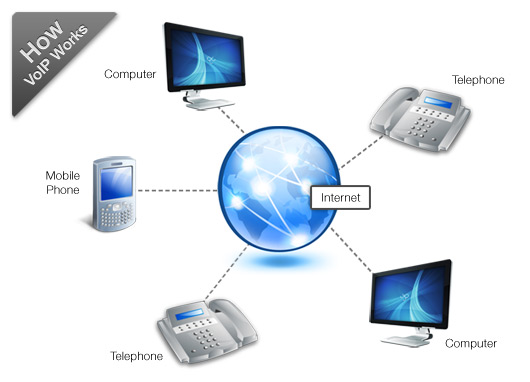Voice over Internet Protocol (also a voice over IP, VoIP or IP telephony) is a methodology and group of technologies for the delivery of voice communications and multimedia sessions over Internet Protocol (IP) networks, such as the Internet. The terms Internet telephony, broadband telephony, and broadband phone service specifically refer to the provisioning of communications services (voice, fax, SMS, voice-messaging) over the public Internet, rather than via the public switched telephone network (PSTN).The steps and principles involved in originating VoIP telephone calls are similar to traditional digital telephony and involve signaling, channel setup, digitization of the analog voice signals, and encoding. Instead of being transmitted over a circuit-switched network, the digital information is packetized, and transmission occurs as IP packets over a packet-switched network. They transport media streams using special media delivery protocols that encode audio and video with audio codecs, and video codecs. Various codecs exist that optimize the media stream based on application requirements and network bandwidth; some implementations rely
on narrowband and compressed speech, while others support high-fidelity stereo codecs. Some popular codecs include μ-law and a-law versions of G.711, G.722, an open source voice codec known as iLBC, a codec that uses only 8 kbit/s each way called G.729, and many others.
Early providers of voice-over-IP services offered business models and technical solutions that mirrored the architecture of the legacy telephone network. Second-generation providers, such as Skype, built closed networks for private user bases, offering the benefit of free calls and convenience while potentially charging for access to other communication networks, such as the PSTN. This limited the freedom of users to mix-and-match third-party hardware and software. Third-generation providers, such as Google Talk, adopted the concept of federated VoIP—which is a departure from the architecture of the legacy networks. These solutions typically allow dynamic interconnection between users on any two domains on the Internet when a user wishes to place a call.
In addition to VoIP phones, VoIP is also available on many personal computers and other Internet access devices. Calls and SMS text messages may be sent over mobile data or Wi-Fi.
How VoIP / Internet Voice Works
VoIP services convert your voice into a digital signal that travels over the Internet. If you are calling a regular phone number, the signal is converted to a regular telephone signal before it reaches the destination. VoIP can allow you to make a call directly from a computer, a special VoIP phone, or a traditional phone connected to a special adapter. In addition, wireless “hot spots” in locations such as airports, parks, and cafes allow you to connect to the Internet and may enable you to use VoIP service wirelessly.
What Kind of Equipment Do I Need?
A broadband (high speed Internet) connection is required. This can be through a cable modem, or high speed services such as DSL or a local area network. A computer, adaptor, or specialized phone is required. Some VoIP services only work over your computer or a special VoIP phone, while other services allow you to use a traditional phone connected to a VoIP adapter. If you use your computer, you will need some software and an inexpensive microphone. Special VoIP phones plug directly into your broadband connection and operate largely like a traditional telephone. If you use a telephone with a VoIP adapter, you’ll be able to dial just as you always have, and the service provider may also provide a dial tone.
Is there a difference between making a Local Call and a Long Distance Call?
Some VoIP providers offer their services for free, normally only for calls to other subscribers to the service. Your VoIP provider may permit you to select an area code different from the area in which you live. It also means that people who call you may incur long distance charges depending on their area code and service.
Some VoIP providers charge for a long distance call to a number outside your calling area, similar to existing, traditional wireline telephone service. Other VoIP providers permit you to call anywhere at a flat rate for a fixed number of minutes.
If I have VoIP service, who can I call?
Depending upon your service, you might be limited only to other subscribers to the service, or you may be able to call anyone who has a telephone number – including local, long distance, mobile, and international numbers. If you are calling someone who has a regular analog phone, that person does not need any special equipment to talk to you. Some VoIP services may allow you to speak with more than one person at a time.
Can I use my Computer While I talk on the Phone?
In most cases, yes.
Does my Computer Have to be Turned on?
Only if your service requires you to make calls using your computer. All VoIP services require your broadband Internet connection to be active.
How Do I Know If I have a VoIP phone Call?
If you have a special VoIP phone or a regular telephone connected to a VoIP adapter, the phone will ring like a traditional telephone. If your VoIP service requires you to make calls using your computer, the software supplied by your service provider will alert you when you have an incoming call.








